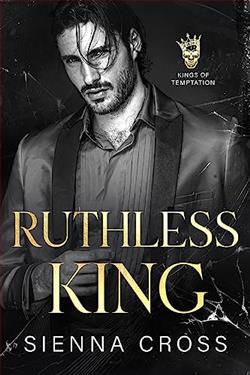Page 67 of The Six Murders of Daphne St Clair
“They had a man approach the front desk and ask to leave you a letter. The staff said we didn’t have anyone by that name living here and refused to take the letter. He became irate, insisting that he knew you were here and that they were lying. It was only when they threatened to call the police that he left.”
“Hmmm. . . wonder what was in the letter?” I mused.
“They just wanted to make you aware of this event and caution you again to stay out of sight—”
“Yeah, yeah,” I interrupted, gesturing behind me with the hand that wasn’t holding my medication. “The doors are locked, the curtains are shut. It’s darker than a witch’s asshole in here, don’t worry.”
The attendant’s face hardened and she stepped close, uncomfortably close. I stepped back, my free hand leaning on my walker as my knees wobbled.
“I wouldn’t push us. You know, we’re all getting sick of protecting you, especially now that we’ve heard you killed a child! It would be a real shame if we made a mistake,” she hissed, before walking off. Now I wish I’d gotten her name.
Trusting these attendants was a real concern. One of the staff could be incentivized (either by money or just pure hatred) to leave a side door unlocked, to point out my window to a person who wanted to harm me. Or they could slip something in my pills. After all, they all wanted me gone from here; that was abundantly clear. I couldn’t trust anyone, and certainly notthem. It was a shame because they loved me before the whole Warren thing, probably because I was one of the least incontinent people in my age range.
I left the pills in my bathroom and sat in my armchair with my hand on the phone for a moment. The apartment was completely silent except for the sound of the ticking clock, relentlessly reminding me that I was alone, and my days were numbered. I stared at the thick swathes of fabric covering the windows. Curtains should make you feel safer, as if you were shielded from the world. But there was something about not being able to see outside that made it scarier.
Anyone could be out there.
BurntheBookBurnerz:
Kind of disgusting to be giving a platform to a child-killer.
ShockAndBlah:
Should Ruth even be doing this podcast? Honestly, I’m starting to wonder about her. . .
HauteHistoire:“Hi, guys, I won’t be doing any more Daphne aesthetic videos on my TikTok. I understand now that my videos glorified and glamorized a senseless murderer and that I was contributing to a culture of violence in our country. Discovering that she may have killed a child only further confirms this decision, although I’d actually been thinking about this for a long, long time. These videos have hugely increased my followers, so I hope you’ll all go on a journey with me as we reflect on how it’s wrong to monetize other people’s pain. I’m still learning every day so thank you all for teaching me. I’m trying to better myself on this crazy experience called life. Anyways, stay tuned for tomorrow’s video where I dive into the Nineties heroin-chic craze and how you too can look like a heroin addict, just one with a platinum card! Okay, thanks, peace and love, byeeee.”
Ruth tried to call Daphne, but she wouldn’t pick up, which was incredibly frustrating since Ruth knew that she was confined to her apartment, always in earshot of her phone. She spent hours watching coverage of the allegations, mainlining sour Skittles and waiting for someone to dig up some concrete evidence that either proved or disproved that Daphne had killed a child.
Should Ruth even continue with the podcast? It could destroy her career if people were outraged enough. People might believe she was on Daphne’s side or that she hadknownthat Daphne was a child-killer and did this anyway. Ruth didn’t do well in high-pressure scenarios. She felt as if she was back in the Palm Haven police station, staring at a two-way mirror, trying desperately to explain how an innocent person could look so damn guilty.
The Reddit comments online were demanding that she put out an episode, that Ruth provide a full explanation of what she had known and what she might have suspected, that she give them a damn good reason to absolve herself. Ruth stopped leaving her apartment, stopped opening her curtains, stopped leaving her bed.
All the media wanted to talk about was Daphne and her dead stepdaughter. The coverage was news releases and rants from outrage magnets. Gone were all the activists, academics, and rebels who’d previously argued that Daphne deserved understanding, if not a little sympathy. No one wanted to appear on TV defending a woman who might have killed a young girl. The public stopped wearing Daphne shirts andSNLstopped doing sketches about her. Everyone agreed that Daphne St Clair was no longer fun. It was just sohardto find a truly ethical serial killer, a sympathetic murderer who aligned perfectly with larger societal issues about class, gender, violence, and power.
Ruth had always thought that the central story of Daphne (the Black Widow who had been repeatedly victimized by men and decided to start victimizing men right back) was true. Now she understood that Daphne would kill anyone who stood in the way of what she wanted. Just because that had typically been men, the people who held the money and the power, didn’t mean ithadto be men.
After all, Robin Hood was just a legend. The true story looked a lot more like Daphne St Clair.
In desperation, Ruth called her mom. When Louise picked up, Ruth explained about the allegations, and how she didn’t know if they were true or not, but that it was giving her second thoughts about doing the podcast. She expected her mom to crow about being right and tell her to abandon it immediately, but her mother surprised her.
“Ruth, at this point, what’s done is done. Quitting the podcast now will only hurt your career. Maybe you’ll be able to get a good job out of this and can move far away. Florida’s not safe for you anymore, so now you just need some money and a reason to go.”
“I shouldn’t have to leave home. I’m innocent,” Ruth protested. Louise sighed. Ruth could hear that she was exhausted, that a long day of work and managing her symptoms had left her depleted and irritable.
“Forget about the past and focus on your future. This podcast won’t bring him back and you’ll never see a cent of that inheritance. So just use it as a springboard to something else.”
“But I worry that it sends the wrong message. Giving her this platform,” Ruth explained, trying to make sense of all the mixed-up emotions inside of her.
“Ruth, you can’t pay the rent on a moral high ground. So, hold your nose and do it for the money because you sure as shit know there’s nothing noble about being poor,” Louise said, her voice frosty. Her mother had always worked minimum-wage jobs, bouncing from offices, restaurants, factories, anything she could get her hands on. There was no time for academic debates in Louise Robinson’s world; there was no time for anything really. She was sick, and she was tired, and her daughter was being a coward.
“But—” Ruth began.
“Ruth, I’m exhausted. This whole thing has been hard for me too. You made your bed, so now, you’re just going to have to lie in it,” Louise said. “Finish this.”
Ruth woke in the middle of the night to the sound of a gentle rapping on her front door. It was so quiet that Ruth wasn’t sure that it was real. Was it a dream? A tree tapping on the wall of her building? No. There it was again.
Ruth sat frozen in bed, unsure of what she should do. It was past midnight, and her apartment was pitch-black since the curtains were all shut. Ruth turned the flashlight of her phone on and sat there, listening to the knocking, frozen, unsure what to do.















